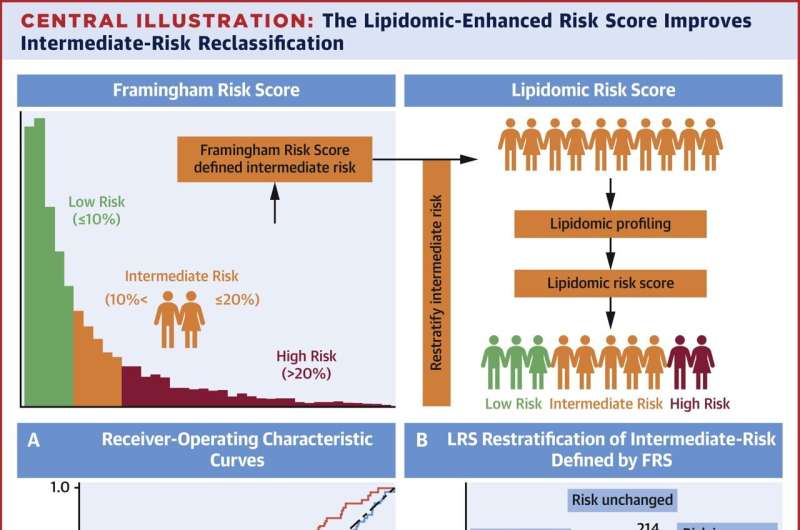This article has been reviewed according to Science X's editorial process and policies. Editors have highlighted the following attributes while ensuring the content's credibility:
fact-checked
peer-reviewed publication
proofread
A new tool to reclassify heart risk and reduce heart attacks

They sit in the middle—the intermediate zone—where they are considered neither low nor high risk for having a heart attack or stroke. But heart disease may well be within striking distance, so how can we more accurately target risk prediction for those in this intermediate group?
Well, scientists at the Baker Heart and Diabetes Institute and La Trobe University have developed and validated a novel, blood-based risk score based on lipids (fats in the blood).
The tool, outlined in their new paper in the Journal of the American College of Cardiology, aims to improve risk prediction and reclassify individuals within the intermediate risk group who might actually require aggressive preventive treatment or alternatively, a stepped-down approach such as lifestyle modification.
For many years, scientists have relied on traditional risk scores such as the well-known Framingham Risk Score which uses classical risk factors like 'good' and 'bad' cholesterol for stratifying individuals into high, intermediate, and low risk.
However, these traditional methods have many limitations, particularly in accurately assessing this middle or intermediate-risk group.
This can be particularly dangerous as there is often a lack of symptoms in the early stages of disease and late diagnosis—when disease or heart damage is more difficult to treat—is common.
So, the scientists have developed a lipidomic risk score that refines intermediate risk assessment where traditional models like the Framingham Risk Score fall short. This will aid clinicians in tailoring precise prevention and management strategies.
Lipidomics expert at the Baker Institute and head of the Baker Department of Cardiovascular Research, Translation and Implementation at La Trobe University, Professor Peter Meikle, says they have developed a version of the lipid risk score for health professionals to use in the clinic—which has the potential to be integrated into routine blood tests—to better predict the risk of heart disease based on high-risk plaque build-up in the arteries.
Professor Meikle says this may help health professionals to streamline the selection of at-risk individuals who should undergo non-invasive imaging such as Coronary Artery Calcium Scoring, to enhance heart prevention and management.
"This approach aims to ensure that we are making efficient use of our health resources and that resources are directed at those who really need them, including treating those at high risk while avoiding overtreating those who don't need it," he says.
Supporting enhanced risk classification of heart disease is a common goal for heart researchers across the country. In 2023, the Australian CVD risk assessment guidelines were updated to reflect the latest evidence on assessing, communicating, and managing CVD risk.
"New research will shape how we continue to enhance and fine tune our approach to heart disease risk," Professor Meikle says.
"It is far better to prevent heart disease than treat it so that is our focus here," he says.
"We want to continue to push the boundaries, to make things easier for clinicians, to make better use of limited health resources and to ensure better outcomes for people who may be at high risk of heart disease but unrecognized."
More information: Jingqin Wu et al, Lipidomic Risk Score to Enhance Cardiovascular Risk Stratification for Primary Prevention, Journal of the American College of Cardiology (2024). DOI: 10.1016/j.jacc.2024.04.060




















